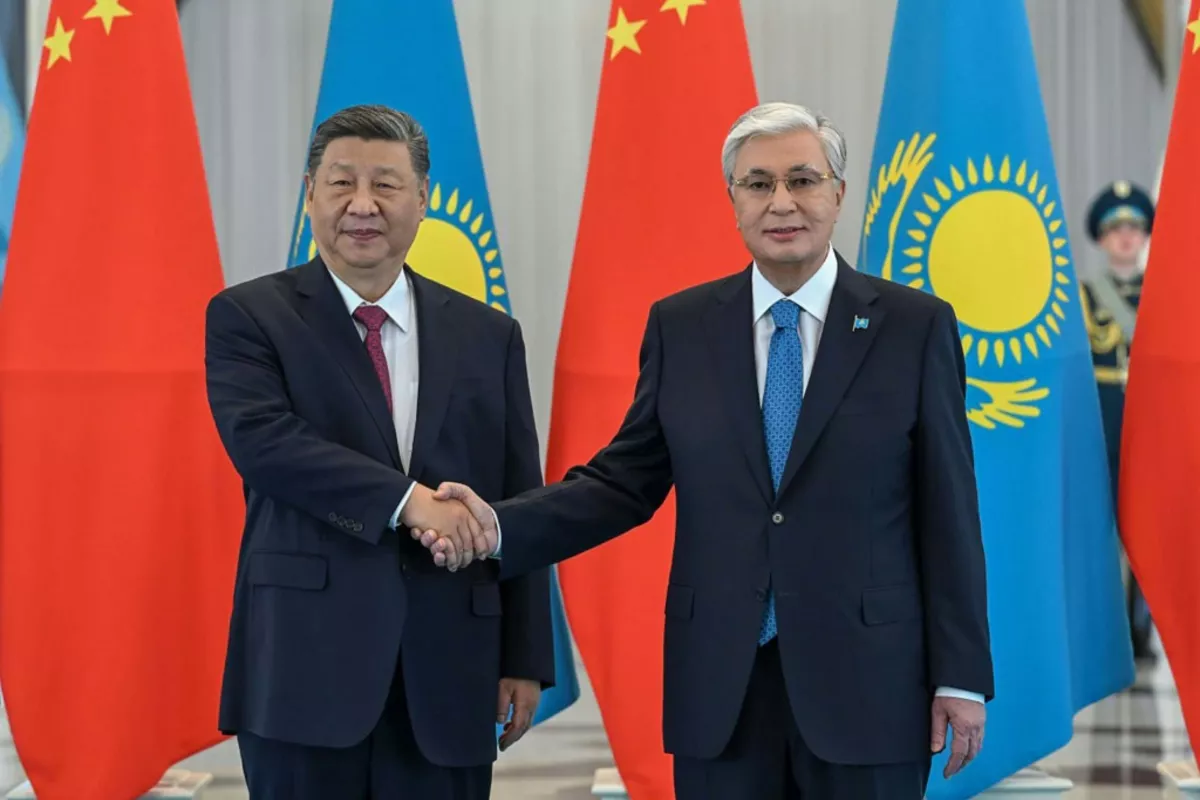
EPA-EFE/KAZAKHSTAN'S PRESIDENTIAL PRESS OFFICE HANDOUT
Kazakhstan’s decision to award contracts for its first nuclear power plants to Russia and China highlights the challenges European companies encounter in competing for potentially lucrative opportunities in Central Asia.
Kazakhstan's atomic energy agency announced on June 14 that Russia's Rosatom - the favorite from the start, given its footprint already in the region - and China National Nuclear Corporation had been selected to build one nuclear power plant each, The Caspian Post reports citing Euractiv.The first contract will be signed with Russia this summer; no timing was given for the Chinese deal.
The agency cited the comprehensive nature of their proposals for its decision.
"Only Russia and China can independently offer a complete range of services, from financing to the location of nuclear fuel cycle conversions, including personnel training, design, construction, handling and reprocessing of spent nuclear fuel", it said.
Between the Bear and the Dragon
The selection also reflects Kazakh foreign policy, which strives to balance relations with these two neighboring powers.
Even though Moscow won a tender, its victory is in fact a half-tone. Dauren Aben, a Kazakh expert in nuclear security, said that 10 years ago, there would have been no debate about who would build such a project in Kazakhstan, with Russia seen as the natural partner for a former Soviet republic.
“But the issue has become political since 2014 and the annexation of Crimea, and even more so since the large-scale war in Ukraine", he said.
On the other hand, relations with China are brighter: during Xi Jinping's visit this week to Astana, which fell on the Chinese president's birthday, Kazakh President Kassym-Zhomart Tokayev congratulated him and spoke of a “golden age” in relations with China.
Although Kazakhstan is one of the world's leading producers of uranium, 70% of its energy consumption is met by polluting, coal-fired power stations. Large parts of the country of some 20 million endure blackouts, especially in winter, prompting Tokayev to declare in 2022 that without nuclear power, “Kazakhstan risks losing its entire economy”. Kazakhs voted overwhelmingly last October to back nuclear energy in the country.
France was the only EU candidate on the shortlist for the contract, along with Russia, China and South Korea.
The French had high hopes, as demonstrated by the personal visit to Kazakhstan last month by Bernard Fontana, chief executive of Électricité de France, or the broader economic courtship between France and Kazakhstan in recent years.
But despite France's diplomatic efforts - and more broadly the signals sent at the EU-Central Asia summit in April and through the EU Global Gateway strategy - Europeans have a long way to go to supplant Russia’s and China’s edge in Central Asia's most important projects.
China is Kazakhstan's largest trade and economic partner. Meanwhile, Russia has a long-standing presence in the region and has been advancing its nuclear diplomacy. Rosatom signed an agreement to build new reactors in Uzbekistan last year, and is in talks with Kyrgyzstan to build the first nuclear plant there too.
Consolation prize for Paris?
A French diplomatic source confirmed that it is not possible for a French state-owned company like EDF to work jointly with Rosatom or, to a lesser extent, with China.
“The idea of an international consortium has not been on the table for a long time”, said another French source close to the matter.
Officially, Kazakhstan had announced three nuclear power plants, and “anything is possible” for the third one, confided a Kazakh source.
For the time being, the only victory for Paris is that the French private company Assystem will supervise the progress of the work for the Kazakh developer, and has just opened its offices in the capital of Astana.
"There's not much France or Korea can do, according to Aset Nauryzbayev, former director of KEGOS, Kazakhstan's national electricity company. He told Euractiv that the decision to award the contracts to Russia and China “had already been made years ago, and the discussions simply served to negotiate a lower price".
Of costs and geopolitics
The cost of the plant - estimated at $11 billion (€9,5 billion) - was a major factor in Kazakhstan's decision.
Moscow and Beijing were able to adjust their offers: Russia “will grant Kazakhstan export financing on preferential terms”, according to the Kazakh atomic agency, as it is accustomed to doing in countries where Rusatom is building a nuclear power plant.
For his part, the head of China's CNNC had said in an interview that he could "build a 1.2 gigawatt reactor in Kazakhstan for $2.8 billion (€2,4 billion), with a construction time of just five years", the fastest and cheapest offer of all. As of now, no costs have been announced for any of the plants.
The Russian VVER-1200 nuclear reactor is to be built in Ulken village, on the shores of Lake Balkhash in southern Kazakhstan. Rosatom has already built this model on Russian territory and in Belarus, and is currently constructing it in Turkey, Egypt, China, Bangladesh and Hungary.
No date, location or model has been specified for the Chinese plant yet.
Share on social media